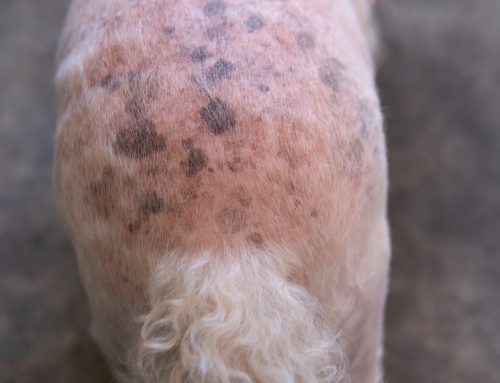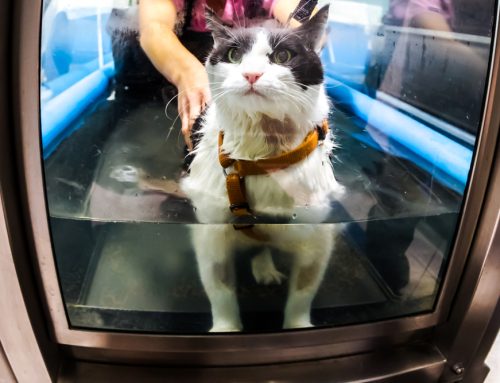Heart disease in pets can be caused by numerous conditions. However, many pets’ heart issues may cause no signs, and the best way to catch early disease is regular veterinary visits for your pet. Our team at the Animal Medical Center wants to educate you on heart disease in pets, and to encourage you to not skip your pet’s annual wellness exam.
What causes heart disease in pets?
Any condition that impairs the heart’s ability to circulate blood through the body is referred to as heart disease. Once heart disease becomes severe, fluid retention occurs, resulting in congestive heart failure. If left-sided heart disease is present, fluid retention mostly occurs in the lungs and the chest space around the lungs. With right-sided heart disease, fluid retention mostly occurs in the abdomen. Common heart diseases seen in dogs include:
- Canine dilated cardiomyopathy (DCM) — DCM results in weakened heart contractions and poor pumping quality. As the disease progresses, the heart chambers enlarge, valves may leak, and congestive heart failure develops. DCM is believed to be genetic, and certain breeds are predisposed, including Doberman pinschers, boxers, Great Danes, and cocker spaniels.
- Degenerative mitral valve disease (DMVD) — The mitral valve separates the left ventricle from the left atrium, and normally closes when the heart contracts, preventing blood from back flowing to the atrium. Elastic and collagen tissue, and spongiosa, compose the valve. In dogs affected by DMVD, the elastic and collagen fibers weaken and the spongiosa thickens, inhibiting the valve’s ability to close properly, and resulting in leakage. Small-breed dogs are most commonly affected.
Common heart diseases seen in cats include:
- Hypertrophic cardiomyopathy — This is the most commonly diagnosed cardiac disease in cats. The left ventricle muscle thickens, decreasing the heart’s ability to adequately pump blood throughout the body.
- Restrictive cardiomyopathy — Scar tissue accumulates on the inner ventricle lining, preventing the heart from relaxing completely, filling adequately, and pumping appropriately. Geratric cats are most commonly affected.
What are heart disease signs in pets?
Some pets affected by heart disease, especially in the early stages, may not show any signs. Signs to look for include:
- Behavior changes — Pets affected by heart disease may not be as affectionate or eager for attention. Cats may hide more or start to urinate outside the litter box.
- Reduced appetite — Your pet may leave food in their bowl or refuse to eat, and may not accept treats.
- Exercise intolerance — Your pet may fatigue easily after moderate exercise, and rest more during the day. They also may have a decreased tolerance to hot, humid weather.
- Weight loss — Weight loss, especially muscle loss, is common in pets affected by heart disease. The muscle wasting typically starts over the back, shoulders, and hindquarters.
- Difficulty breathing — When fluid starts to accumulate around the lungs, full lung expansion is prevented, and the lung’s ability to deliver oxygen to the blood is decreased. You may notice your pet breathing faster, or having difficulty breathing.
- Coughing — When fluid starts to accumulate in the lungs, your pet may start to cough.
- Fainting — An abnormal heart rhythm can cause fainting—this is more commonly seen in dogs than cats.
- Abdominal swelling — When fluid starts to accumulate in the abdomen, your pet may develop a pot-belly appearance.
- Rear limb paralysis — Cats can develop sudden onset paralysis in their hind limbs, caused by a blood clot blocking blood flow to one or both limbs.
How is heart disease diagnosed in pets?
The signs of some heart disease conditions in pets can be heard when their chest is auscultated. Your veterinarian may hear a murmur, arrhythmia, or an abnormal heart rate. If your veterinarian hears an abnormality, they will perform further diagnostics, including:
- Chest X-rays — An X-ray can show an enlarged heart and indicate fluid in the lungs and chest cavity.
- Bloodwork — Blood tests can indicate heart muscle damage.
- Electrocardiogram (ECG) — An ECG may be needed to test the heart beat’s timing and strength.
- Echocardiogram — Ultrasounding the heart is the best way to see any abnormalities.
How is heart disease treated in pets?

Most heart disease issues cannot be cured. Treatment is focused on addressing the underlying cause, and decreasing fluid accumulation. Diuretics are used to reduce blood volume, which decreases the pressure in the veins, and results in less fluid accumulation in the chest and abdomen. Other drugs may be prescribed to help the pet’s heart function better. Monitoring the respiration rate, especially when the pet is asleep, is a good way to evaluate if the pet’s medications need adjusting.
What is the prognosis for heart disease in pets?
The prognosis depends on the underlying cause, and when the problem is identified. Conditions diagnosed early typically can be managed more effectively, and have a better prognosis. Pets with the more common diseases, such as mitral valve disease in dogs and hypertrophic cardiomyopathy in cats, usually survive less than two years once congestive heart failure is diagnosed.
Your pet’s regular annual wellness exam is the best way to catch heart disease in the early stages, and to keep their heart healthy. Contact our team at the Animal Medical Center if you have any questions, or if you would like to schedule your pet’s annual wellness exam.







Leave A Comment